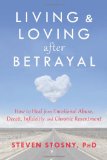
 Living and Loving After Betrayal
Living and Loving After BetrayalHow to Heal from Emotional Abuse, Deceit, Infidelity, and Chronic Resentment
Review posted November 28, 2013.
New Harbinger Publications, Oakland, CA, 2013. 235 pages.
Starred Review
2013 Sonderbooks Stand-out: #1 Nonfiction
Steven Stosny's books helped me tremendously after my husband left me, particularly You Don't Have to Take It Any More, which was retitled Love Without Hurt. I also went to his Compassion Power Boot Camp after I moved to Virginia, and it helped tremendously in my healing.
However, those materials were designed to help someone when in the middle of an abusive relationship. Now that my divorce is final, I have no more contact with my ex-husband.
So I was delighted when I heard about Steven Stosny's latest book, Living and Loving After Betrayal. It uses his powerful approach of self-compassion to help you heal after betrayal and be ready to love again -- whether getting back together with your spouse or someone else.
Now, I've come a long way since my husband left me. But these are wonderful reminders of how to stay healthy. Just this morning, I woke up from a dream about my ex-husband that made me feel rejected all over again. I turned to Steven Stosny's methods, reminding myself of my core value, and didn't get sunk in feeling bad all day.
What's more, if I ever dare to get in a new relationship, I am glad to have this wise advice about avoiding a potential betrayer, and learning to trust again. And reading this also makes me less afraid to start a new relationship.
As with his other books, the crux of Steven Stosny's healing techniques is self-compassion, and focusing on your own core value.
He doesn't focus on what happened, but more on how to heal. However, he does understand that betrayal is hard to overcome.
Whether it crashes upon you in revelation or seeps into consciousness via delayed realization, intimate betrayal snatches the floor of personal security from under you. Most of my clients describe the initial aftermath of revelation and realization as a kind of free fall, with no bottom in sight. Shock and disbelief are punctuated by waves of cruel self-doubt:
Was I attractive enough, smart enough, successful enough, interesting enough, present, attentive, caring, patient, or sacrificing enough?
He shows you how to use your emotional pain to help yourself to heal, improve, repair and grow.
Self-compassion is a sympathetic response to your hurt, distress, or vulnerability, with a motivation to heal, repair, and improve. It brings a sense of empowerment -- a feeling that you can do something to make your life better, even if you are not sure what that might be at the moment. It tends to keep you focused on solutions in the present and future.
Self-criticism is blaming yourself for your hurt, distress, or vulnerability, usually with a measure of punishment or contempt. It's based on the mistaken idea that if you punish yourself enough you won't make similar mistakes in the future, when just the opposite is true -- self-punishment leads to more mistakes. (Who is more likely to make more mistakes, the valued self or the devalued self?) Self-pity is focus on your pain or damage with no motivation to heal, repair, or improve. It has an element of contempt for your perceived incompetence or inadequacy because it assumes that you can't do anything to make your life better. Needless to say, self-criticism and self-pity turn pain into suffering.
One of the problems after betrayal involves post-traumatic stress and obsessive thoughts. This book shows you how to recondition your brain with restorative images whenever painful thoughts surface. I was able to use those techniques this morning after waking up from a dream about my ex-husband. They work!
Steven Stosny explains that the key to healing and growth is your core value.
Core value grows out of the uniquely human drive to create value -- to make people, things, and ideas important enough to appreciate, nurture, and protect. Consistently acting on the drive to create value provides a sense of meaning and purpose in life. This chapter and the next will help develop your core value as a general means of healing and growth. Although a highly developed core value won't make you forget your betrayal, it will definitely make all that you have suffered less important in your life as a whole. The past can no longer control us, once it is overshadowed by the deeply human drive to create value and give our lives meaning.
He finishes the book with tips about getting into a relationship again, whether with your betrayer or someone new. Here's hoping I will have a reason to look at those tips again! Reading this book made that idea seem much less impossible. Here's to healing!

